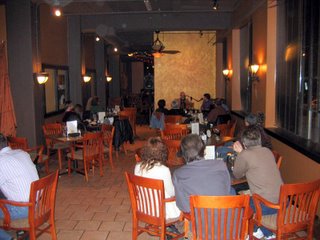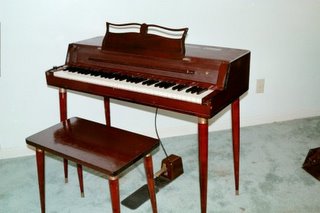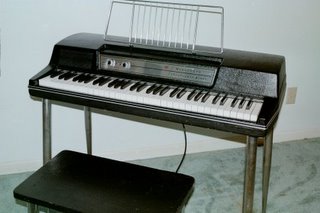
Last night was perfect in every respect.
I accompanied the very talented singer-songwriter Gordon Ellis on piano at Kazu restaurant in Nashville at a songwriters night hosted by the Songwriters Guild of America. We played six of Gordon's original songs, none of which we had rehearsed together beforehand. Our performance was virtually flawless! Gordon and I have this ability to connect rhythmically and harmonically musically in some kind of unconscious way that I find it hard to describe. He was extremely gracious in his compliments to me during our set. Gordon has asked me to accompany him for another showcase on May 5. This time we'll be joined by an extremely talented lead guitarist, and I'll get to sing HARMONIES!!
Gordon and I performed first, after which we got to sit down and enjoy 90 more minutes of Nashville's finest musical talent, including Charles Alexander and Donna Frost and Melissa Jaggers on piano accompanied by Jeff on cello and harmonica.
But those are just some of the musical aspects of last night.
My beautiful wife, who is my most ardent supporter, was watching and listening in the audience along with three good friends. We all enjoyed the fine "fusion cuisine" (Asian/Mexican) and some tasty beverages, along with the beautifully decorated restaurant. Kazu is definitely major a step up in class from some of the places I've played!
After the show, I handed out all of my the keyboard business cards I had with me and then had to dip into my professional "day job" business cards. Everyone in attendance really loved my playing, and they responded with loud applause, once in the middle of a song after I finished a particularly rousing "boogie woogie" style improvised piano lead.
I really expect that this kind of exposure will continue to get me more work.
It's impossible for me to understate how important the support and encouragement of my wife is for me. I've been married twice before, and although my previous wives were (mostly) generous in allowing me the space and time to do my music, none of them were nearly as proactively supportive as my wife is now.
With my wife's continued support, I plan to take this as far as I can this time.
Before I've always had to compromise in some significant way. The compromises were necessary for me, and they were deliberate. For example, I had my dad sell all my music equipment hung up my keyboards after I graduated from college in 1968 and entered Navy OCS, because my wife and I needed the money, and at that time I was convinced that playing music was a childhood thing, it wasn't serious, and that it would only distract me from the more important business of surviving the Vietnam War and starting a family.
I was lucky enough to escape Vietnam with an early-out in 1969, upon which I landed an entry-level management job with the Telephone Company. In 1971 at the urging of my boss, I joined the Jaycees, and through that association met a fellow Jaycee ("Doc") who had formed a band. This was a very different kind of band, however. He was the Assistant Warden of Fairfax Correctional Institute #30 (a.k.a. "Camp 30"), which is a minimum-security prison in the Washington, DC suburbs of Fairfax County. Many of the prisoners were musicians (music + drugs = jail), and so he would pick out the best of them to jam with him at his house, which was on the prison grounds. All of the band except for me and Doc were black; this was my first experience playing with black musicians.
But I'm getting ahead of myself. At one Jaycee party Doc brought along his guitar and played a few simple blues tunes. Since a piano happened to be present, I jammed along with him and really got a kick out of the experience.
 Not long after that, I picked up a used Wurlitzer Electric Piano for a couple hundred dollars at a music store and joined Doc's prison band.
Not long after that, I picked up a used Wurlitzer Electric Piano for a couple hundred dollars at a music store and joined Doc's prison band.(Sidebar: I sold that piano on Ebay in 2001 - 30 years later - for $931 to someone in Lubbock, TX. A few months later, I swear I saw Norah Jones playing this same instrument in a Ryman concert with Willie Nelson. The instrument is completely unique to my knowledge; I've never seen another mahogany finish Wurlitzer Model 120, which I discovered was built sometime around 1958. )
The prison band didn't work out too well, but it will be worth a chapter in my book. We had a couple of fun gigs for all-black audiences, which gave me to opportunity to experience (1) being a minority and (2) the incredible community of black people. I also got to experience being in a band where the leader had to get the other members out on work-release to play gigs.
After a particularly unglorious exit from Doc's band (many more stories to come), I had my start back into playing. I put an ad in the classifieds seeking work as a piano player and soon found Dennis Swindle (that's right, SWINDLE), knocking at my front door. He had been doing a solo act but wanted to add a piano accompanist. We rehearsed 50 songs one night in my basement, then he called the notorious booking agent "Forty" Thomson (so known because he reputedly took 40% commissions), who told Dennis he could have a gig THAT weekend if he had a band together. Dennis, not known to stick too closely to the truth, replied that, yes, he did have a band. So we were booked into the "1-2-3" enlisted club (for the lower 3 tiers of the enlisted ranks) at Fort Belvior as a 4-piece band. Dennis arranged for two buddies he worked with at Music & Arts to play with us on bass (Steve Boyle) & drums (Kim Turner). So, Dennis and I show up for the gig, with absolutely no rehearsal except for the 4 hours or so we spent going over his 50-song repertoire the previous Tuesday night. Kim showed up, I shook his hand, and he set up his drum kit in time to start. Steve got lost trying to find the place and showed up just in time to set up his bass rig for the first song. I introduced myself to Steve during our first break. We played fine for the crowd of professional drinkers - mostly simple 3-chord songs like Creedence Clearwater Revival, etc.
That band was called "Thaxton & Reed" because Dennis (who went by the stage name "Dennis Thaxton") and I had intended to be a duo. However, since we'd already made up business cards, we kept the same name after adding the other players. We played lots of military gigs over the coming months, and the band finally broke up in late 1973 when Dennis moved out of town.
I then put another ad in the classifieds and in December 1973 found myself rehearsing with a group called "Inner Light," which at that time had just sighed a year-long contract to play Friday & Saturday nights at the Olney Inn in Olney, MD. The group made up its name, not for the Beatles song of the same name, but because they were the "light" of the "Inn." Get it? Yeah, I thought so - I didn't think it was all that clever either, but the name worked for us. The Inn was near the Olney Dinner Theater, so people would come for supper before the show and then afterwards stop in for a nightcap and maybe a little dancing. The Olney Inn was built in the mid 1800s, and the walls were covered with a mural depicting life in Colonial America. It was the kind of place you'd take your grandmother for Mother's Day. I'll never understand why the owner decided to hire a band to play there, but I wasn't going to look a gift horse in the mouth.
Inner Light had to cram itself into a tiny border about 4 feet wide between the dance floor (which might accommodate 10 couples if they were especially friendly - or drunk). We had to play at such a reduced volume that the bartender's blender would drown us out on a slow night. People sat eating dinner at tables less than 3 feet from our PA speakers! I have several recordings of us playing there, and when band members talk with one another, you can clearly hear our hushed conversations over the music.

In the spring of 1974 I bought a new Model 200 Wurlitzer Electric piano, which I also sold on Ebay in 2001, for $2,000 to a studio operator in Rome, Italy (plus $400 for shipping!). I kept this instrument in impeccable condition by having a lumber-cord plywood case built for it, in which it was always stored when not in use. The case with the piano in it weighed 140 lbs., which I hauled up and down many a staircase by myself. I used a Peavey Musician 200-watt amp with it, which stood about 4 feet tall with 4 12-inch speakers. My entire rig weighed somewhere in the neighborhood of 400 lbs.
Hard as it was, the Olney Inn was excellent training for Inner Light. After playing 110 nights at the Olney Inn at whisper-level volume (even while doing such songs as "Smoke on the Water" and "Tush"), we were perfectly poised for a big success in the wedding/bar mitzvah/country club circuit. We were able to play energetic music at a soft volume, which distinguished us from every other band with whom we were in competition for these well-paying gigs. In addition, we had a beautiful young lead singer (Susan Frasier) and a girl drummer (Carol Kozelsky, married to guitarist Jerry Kozelsky), which gave Inner Light a distinctive look that other all-male bands lacked. The bass player was none other than Steve Boyle, whom I recruited to join the band after our first bass player left for a country-rock band. In early 1974 Inner Light signed a contract with Washington Talent Agency, which was and still is one of the premier agencies in the DC area.
Inner Light gigged intensively; I played 362 jobs with them during my 3 1/2-year time in the band. I resigned in April 1977, when my children were ages 7 and 5. My extended weekend absences from home were creating increasing tension between me and my wife, and the kids needed their daddy. I often had 3 gigs a weekend - one on Friday night, one Saturday afternoon and another Saturday night. These were almost always one-nighters, meaning that we would have to set up and tear down at a different place for each gig. Washington Talent kept us busy playing weddings, bar mitzvahs and bat mitzvahs (we used to joke that a bat mitzvah was when a Jewish girl became a man). We made good money for those days; I managed to finish the basement of our townhouse and replace the linoleum flooring with my Inner Light earnings. Several chapters of my book will be devoted to the Inner Light years; this was my first seriously-working professional band, and like all bands this one gave me lots of unique and memorable experiences. As my wife will tell you, I am an inveterate packrat and have a record of every single gig I have ever played with every band I've ever been a part of, plus many memorabilia from this important segment of my life.
I got out of playing music entirely for a period of 11 years (1977-1988), and didn't get back into it again until my children were ages 18 and 16. During that 11 year period I never had any intention of ever playing music professionally again. It's hard now for me to look back on that period and believe that I actually thought I would never play again.
What was I thinking?
In 1988 I got back into music by auditioning for an eventually becoming the leader of Mirage, a kick-ass classic rock band. But that's a story for another post.
So this long post started as a reflection on my gratitude for having such as supportive spouse, and how I intend to take this thing to the absolute limit this time. How much time do any of us have, and how much of that time do we intend to waste not doing what we want to do? It took me a lifetime to discover who I really am, and I intend to be fully myself for the rest of my time.

1 comment:
This is an old entry, I know, but I'm pretty sure the Dennis Swindle in that story is my dad. :-) I just thought that was kind of neat. I'll point him towards your site!
Post a Comment